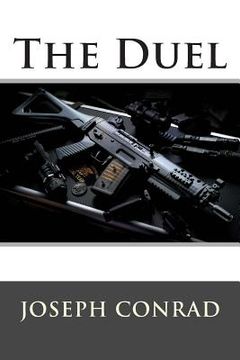Reseña del libro "The Duel (en Inglés)"
I. Lieutenant Armand D'Hubert calls at the house where Lieutenant Ferand is billeted in Strasbourg, in search of information on his whereabouts. Ferand has risen early, fought a duel with a civilian and injured him, then gone out to call on a woman who holds a salon. D'Hubert goes to the house and transmits to Ferand the official message that he must return to his quarters and remain under arrest. Ferand is annoyed, and cannot see that he has done anything wrong. D'Hubert explains that his opponent's civilian friends are well connected and have made complaints. When the two men return to the house Ferand threatens D'Hubert for disturbing his afternoon. Ferand draws his sword and challenges him to a duel on the spot, in the rear garden. D'Hubert realises that Ferand seriously wishes to kill him, and that the duel will get both of them into trouble, but he manages to strike a damaging blow to Ferand, which cuts his arm. D'Hubert then visits the regimental surgeon and sends him to attend Ferand. He is annoyed with Ferand but glad he has not killed him. D'Hubert is disgraced and reduced to the ranks. Then he is visited by the surgeon who tells him that Ferand, having now recovered, intends to continue the dispute with a further duel. The public assume that there must be a very serious difference between the two soldiers to make them risk their reputations in this way. II. Various theories are advanced in society to try to explain the conflict. The two men arrange another duel, in which D'Hubert is slightly hurt. Their seconds urge a reconciliation, but it does not take place. There is a proposal to appoint a deciding Court of Honour to resolve the dispute, but Ferand prefers to say nothing. The colonel of D'Hubert's regiment is concerned, takes a parental interest, and asks for an explanation. D'Hubert refuses to go into details, but assures him it is a matter of honour - both personal, and for the regiment. The colonel imposes a twelve month ban on any further duelling, during which time D'Hubert is promoted. This renders any further challenge impossible under the codes of duelling, because of the differences in rank of the disputants. Ferand then seeks and gains promotion, which leads to another duel. This leaves them both cut to ribbons. After they recover D'Hubert is promoted again onto the personal staff of a marshall. Ferand cannot stand the idea of having to take orders from him. The next duel takes place on horseback at dawn in Lubeck. D'Hubert inflicts a single damaging blow to Ferand's forehead and the duel is stopped. Both men stay on in the army, and gradually grow older. III. During the retreat from Moscow in Napoleon's disastrous campaign, the two men are yoked in misery and defeat, but choose to ignore each other. However, they co-operate in military terms, and even help each other to survive. D'Hubert becomes dressed in a bizarre collection of old clothes collected from the wreckage of the retreat. He wants a peaceful life, and even begins to doubt the wisdom of Napoleon. However, his good conduct is favourably noticed by the 'Emperor', and when he is promoted to a general, this inflames Ferand's rivalry. D'Hubert is badly wounded, and recuperates at his Royalist sister's home in the south of France. Then he is despatched to Paris and is introduced to a girl who he plans to marry. Napoleon is on St Helena, and the royalists plan to persecute Ferand. D'Hubert intervenes with the Minister of Police, and has Ferand's name removed from the list of Bonapartist officers due to be punished (executed). As a result, Ferand is retired from the army and banished to an obscure town in the middle of France. Instead of being grateful, he is outraged at the indignity, and plans yet another duel with D'Hubert.

